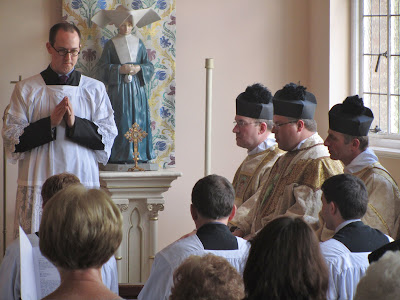 Seminarians brave enough to be photographed cheering the Holy Father!
Seminarians brave enough to be photographed cheering the Holy Father!
(Image courtesy of in interesting US site truemanhood.com)
seminarians are quizzed about their interest in the Extraordinary Form in such a way as to make clear to them that any interest would be considered a problem and as they used to say in my time, `a formation issue`.Sadly, similar news has also reached my ears. Prospective seminarians are not usually told outright that they will not be accepted if they are deemed "too traditional" but the way questions are phrased and the attitudes they encounter tell them that it will not be worth their while pursuing a vocation in diocese X. "Wouldn't you be happier somewhere like the Oratorians" was the crass suggestion to someone of my acquaintance applying to one diocese, as though that was where oddballs like him should go. Insulting to him and to the Oratorians who have thriving parishes and communities in this country. I understand that in the very excellent Oxford House there is simply no room to take on any more candidates.
Just recently I was speaking to a young man who seemed to me to be an ideal candidate for the Priesthood in every way that I could see but whose sortie into the diocesan selection process was not successful. He is now training with one of the traditional priestly societies.
Someone else I know - again a young man with faith, drive, ability and a desire to test his vocation - simply found the attitudes he encountered to be less than encouraging and saw the prospective training that was being held out to him to him as lacking in many areas.
Some years ago yet another friend with a known past interest in the Extraordinary Form the was turned away by an English diocese. He's now ordained in a diocese outside England.
It indicates the still prevalent attitude in most diocese that the Traditional Mass and allegedly "conservative" (read orthodox and loyal to the Holy Father and the Magisterium) are okay in little enclaves but not wanted in the mainstream, thank you very much. I'm not sure why this should be, except that there are none so blind as they that will not see because it is precisely in the "mainstream" - diocese and ordinary parishes - that the liberal experiment shows most glaringly that it has failed. In these schools and parishes we find the limp Catholicism that is hardly worthy of the name and where the numbers dwindle year on year until the parishes amalgamate and then close; where no vocations are produced and then the seminaries close; where Religious Life is unheard of.
The point that the Holy Father is, I believe, trying to bring home to the wider Church in Europe and the West, is that the influence of the traditional Mass and loyalty to the Holy Father and the Magisterium is precisely what has been missing from the formula being experimented with over the last forty years. The men finding it tough applying to the diocese in this country are the very men we need to bring on board instead of turning them away but they challenge the status quo too much by asking for formation that will teach them discipline of life, faithfulness to the Magesterium, the Traditional Mass and the Latin language.
Seminarians (if you can get that far) certainly need the the encouragement the Holy Father offered yesterday:
Dear seminarians, do not be afraid to take up the challenge in today's Gospel to give your lives completely to Christ. Indeed, may all of us be generous in our commitment to him, carrying our cross with faith and courage."
.


































